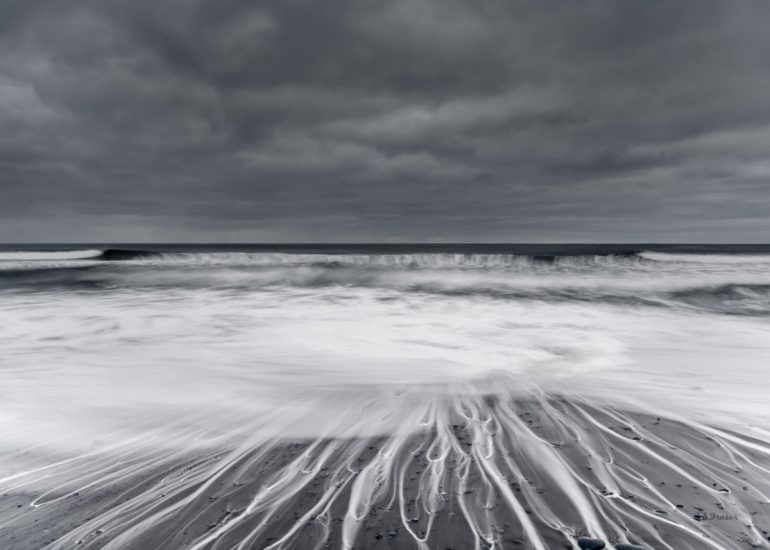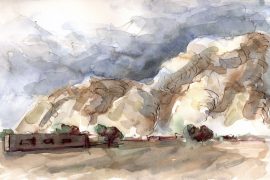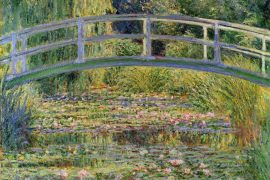Psalm 104:5-9
[openquote]You set the earth on its foundations,
so that it shall never be shaken.
You cover it with the deep as with a garment;
the waters stood above the mountains.
At your rebuke they flee;
at the sound of your thunder they take to flight.
They rose up to the mountains, ran down to the valleys
to the place that you appointed for them.
You set a boundary that they may not pass,
so that they might not again cover the earth.[closequote]
I remember a trip one summer in Oregon. We were out on a glacial lake. This wasn’t some stormy sea, but a glassy, pristine lake. You could quite literally see all the way to the bottom. And the bottom was a long way down.
It was deep water, and it freaked me out.
“Deep water!” became my rallying cry. I yelled it out to my friends in the canoe whenever I caught a glimpse of the immensity that was beneath us. I yelled it as if in naming the danger that lay dormant, I would be protected from it.
As we return in this second week of Lent to our walk through Psalm 104, we find some “Deep water!” of our own. Again, the imagery from the Psalm draws us back to the creation narratives. This unit of Psalm 104 retells the separation and organization of water in Genesis 1:1-10. The image at the open is one of chaos, of pure primal materiality. Then God steps in and subdues the great waters of the deep. So too here in the Psalm.
Water is often a representation of this chaotic force, but in world of jet airplanes and space travel we may have forgotten how immense (and dangerous) the sea is. Great bodies of water can captivate us with their massiveness, nearly hypnotizing us as we stare into them. But it is not docile, water’s power is on full display when tsunamis and storm surges batter our shores. Water can rise uncontrollably in our homes and towns. We can feel it crush against us when we dive into the ocean’s waves. It tugs at us when we cross a flowing river. Water is a terribly ferocious and indiscriminate power when unconstrained.
But that’s not where the Psalm leaves us. The image here is one of ordering, restraining, placing these great waters within a proper set of limits. This theme of limits is something we see throughout the Old Testament narratives, and certainly through Genesis 1-3. The picture that emerges in this Psalm, and in Genesis, is a God who orders creation through these limits—that sets things in their proper place. And yet we, like the waters, cross our banks (perhaps more frequently than even rivers do). Limits are knit into the fabric of creation, into our own very beings.
We are created, finite creatures. We live. We die.
But in our living we often imagine we are something else, that, in fact, there are no limits. Ellen Davis responds, “The biblical writer does not subscribe to the fantasy that our society has embraced as an ideal – that human ingenuity runs up against physical limits only in order to overcome them” (Scripture, Culture and Agriculture, 31)
Some limits are not meant to be shaken.
By Nick Babladelis, EcoTheo.org Staff
Questions & Actions
- If you haven’t already, read the whole text of Psalm 104, the text of the first creation narrative in Genesis 1-2:4, or both. Take note of what stands out to you as confusing or interesting. Share your thoughts below.
- Confronting our own limits are often powerful because they remind us of our dependence, on one another, creation, and God. Take a moment and reflect on some of the ways you depend on each of these.
- What do you think might be some basic limits for humanity in relation to creation? What might be some of the guiding principles we should operate under? Actually try to write out a list. You can think in general terms or you might think about specific issues (like our use of the land, of what we eat and where it comes from, of the technology we implement in healthcare, or maybe there is already a topic on your mind). Share it with us below.
- Discussing limits is a natural pairing for Lent, what with all the fasting and abstaining. So, if you haven’t already made it a part of your Lenten journey, consider a fast of some kind for an hour, a day, a week (the commitment is up to you). And while it can certainly be from food (there’s no quicker way to come in touch with our limitedness, dependence, and mortality), it can be from other things that push us to feel limitless. Maybe it’s a cell phone, social media, a video game, or your favorite TV show. When you would normally be eating, or browsing Facebook, or whatever you’ve chosen, turn instead to God in prayer. Seek to understand more fully your own limits and your need for dependence.




